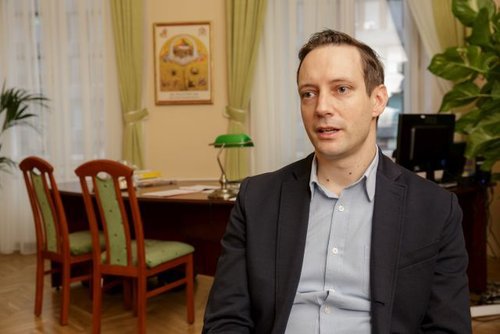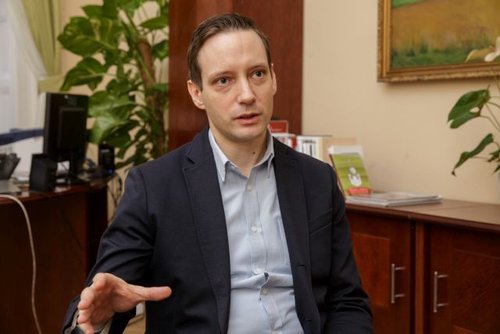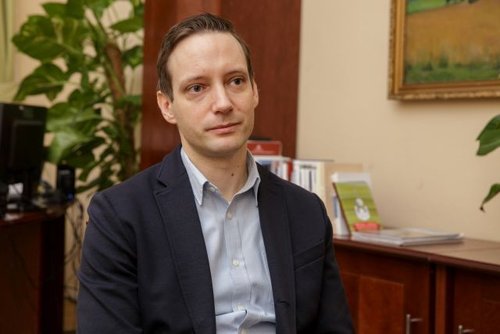“We are doing everything in our power to ensure that Christianity does not disappear from its cradle of two thousand years,” said Tristan Azbej, Deputy State Secretary for the Aid of Persecuted Christians, when interviewed by reformatus.hu, adding that they are also seeking ways to enable Syrian Protestants to stay in their homeland.
The task I have been assigned is a mission, and all of my colleagues feel the same way. Our goal is twofold: firstly, to provide support for the Christian communities that are experiencing threats, discrimination and genocide, and secondly, to advocate for their cause, raising our voice on the level of diplomacy – says Tristan Azbej, when asked about the duties of the Deputy State Secretariat for the Aid of Persecuted Christians.

What were the specific commitments when starting this noble and formidable task?
In the absence of previous examples we could have followed, any method we use is experimental. We could view it as a kind of experiment in which failure is not an option, since what is at stake is a great number of human lives. Therefore, we are guided by the needs rather than our predetermined commitments: we simply wish to save lives and use our modest resources to contribute to the continuous presence of the endangered Christian communities in the Middle East, Africa and other regions. Accordingly, our first programs were emergency humanitarian relief to the internally displaced refugees who had remained in the Middle East, while the second wave of financial support was aimed to enable Christians to stay in their homes and for others to return home.
“Statistics reveal that Christianity is the most persecuted religion in the world: four out of five people suffering from religious persecution are Christians. And yet, the world turns a blind eye to this problem.”
According to the Deputy State Secretary, it was due to this realization that the government of Hungary, as the first in the world decided to address the issue on a governmental level. The Deputy State Secretariat for the Aid of Persecuted Christians was established in October 2016 within the Ministry of Human Capacities.
How would you evaluate the past one and a half years?
Our programs have contributed to the achievement of tens of thousands of people to remain in their homeland. We have improved living conditions in a number of refugee camps in Iraq, Syria and Lebanon, prolonging the period during which residents are waiting patiently to return to their homes. Our financial support for reconstruction is best exemplified by the developments in Tel Eskof in Northern Iraq. This village near Mosul used to be the home of 1300 Christian families before it was occupied by the terrorist organization, ISIS, in 2014. The lengthy armed conflict caused significant damage to the settlement; hundreds of buildings were destroyed. Since then, Tel Eskof has been rebuilt thanks to the support of Hungary, and as many as 1000 Christian families have returned home. Others have followed our lead: for example, the U.S. charity organization Knights of Columbus has undertaken the reconstruction of another settlement in the Nineveh Plains, where thousands of people live.
According to the 2018 World Watch List of the well-known Open Doors Organization, of Dutch origin serving persecuted Christians worldwide, Iraq is only the 8th most dangerous country and Syria is the 13th in this ranking. Why is the focus on the Middle East?
It is very important to help wherever we can. We determine the location and the level of support considering our resources, strengths and limits. However, we have diplomatic and military limitations. We can save the most people and provide the biggest and most efficient aid in the Middle East and Central Africa.
What is the objective of the Deputy State Secretariat about the countries on the top of the World Watch List?
North Korea is leading the shame list of the countries persecuting Christians; however, Hungary realistically has no real means to prevent the regime from sentencing someone to death for possessing the Bible. In other countries, the sharia, the Islamic law, heavily discriminates the Christians in their religious practice. We cannot directly force these countries, either. It would only worsen the situation of the local Christian communities. For their protection, we try to intervene for them in the international arena: we are quite active in the United Nations, we are becoming more and more engaged in the European Union, and we have started negotiating with the International Court of Justice in Hague for them to advocate worldwide protection of the endangered Christians, whose rights are limited.

How successful is this kind of advocacy work?
In this regard I cannot talk about a big breakthrough yet. I have to say the governments of the western countries and the international organizations are slow to admit the humanitarian catastrophe hitting the Christians worldwide, and that this situation requires an immediate reaction. But promising negotiations are being made among the countries of the Visegrad 4 (Poland, Czech Republic, Slovakia and Hungary), especially with Poland with whom we are planning to intervene together at the session of the United Nations Human Rights Council. However, I can account for one success in this field: a year ago the Government of the United States of America expressed its appreciation for our work. Since then, Vice President Mike Pence has announced that the U.S. will probably start a government program, this year, supporting persecuted Christians, with the same principles as ours.
Principles of aiding persecuted Christians:
1.Honest dialogue. “We are directly negotiating with leaders of the affected communities; we have made several journeys to the regions in crisis to personally gain information and ask them what kind of help they need. Besides this, we invite them to Hungary and provide publicity for them to speak of their communities’ hardships to the world.”
2.Direct support. “Much of the offerings from donors of good intentions are not being used efficiently because they are entrusted to organizations that charge administration costs and tracking the donations cannot be followed precisely, such as who receives the support or whether or not the local governments are passing along only disproportionally small amounts of the donations to the Christian minorities. We are partnering with the affected churches and making sure that in this way the donations are fully spent on what the indigent community needs.”
3.Aid for staying. “Based on the feedbacks, it is clear that these people would like to stay in their homeland. Last December, the Archbishop of the Melkite Greek Catholic Archeparchy of Aleppo said, during his visit to Budapest, that if migration from the region continues, it will determine the fate of the Christian communities in the Middle East. Therefore, through our programs we try to assist these communities to live a full life in their homeland.”
What are other ways you support the Christians in the Middle East, besides funding reconstructions?
In the last fifteen years, the number of Syrian and Iraqi Christians decimated, and even dropped to a fraction. According to prudent estimation, the number of Christians in Syria dropped from 2 to 1 million, and in Iraq, it decreased from 1.5 million to 300 000. A great number of Christians in the region are also internally displaced. The most important refugee camps in Iraq are in Erbil. For years, thousands of families have been living in miserable conditions: homes as 9 m2 containers in soul-destroying and inhumane situations since ISIS had expelled them from their homelands. In the region of Nineveh, 13 000 buildings are waiting to be rebuilt, which takes time. As patience lessens, the people feel they are forced to leave Iraq and the Middle East. We try to make life there more bearable by supporting the hospital in Erbil with medicine, and we have also built a school for refugee children.
During our solidarity visit to Syria, we noticed that the Reformed churches in Syria put an emphasis on improving the cohabitation of Christians and Muslims. Is this also an aspect in the program of the Deputy State Secretariat?
While we are receiving much appreciation and our work is seen as an example, we also receive critics saying that it is discriminating to support only the Christian minority and it can be seen as displeasure to majority society. Despite these critics, the truth is that we are supporting the entire region through the Christian communities. At the beginning of our first program, we wanted to set a condition according to which people of other faith cannot be excluded, but we soon realized that this was not necessary as it was exactly how the local Christian leaders thought as well. Western organizations and governments are organizing conferences on interfaith dialogue. On the other hand, our understanding of interfaith dialogue is focused on enabling the local Christians to make life better and more bearable for people of other religions as well.

What happens if – God forbid – staying in their homeland becomes impossible?
This is already a world-wide crisis which cries out for international cooperation. If this pessimistic scenario took place, handling such a catastrophe would go much beyond our support policy. A joint global effort would be even more required, because if we were to passively watch Christianity disappear from its cradle of two thousand years, our entire generation would be accountable. We are working to not let this happen. But for the time being, we can only focus on the burning issues in the present.
At the time of the establishment of the Deputy State Secretariat, Zoltán Balog, Minister of Human Capacities, asked for the help of the churches. What are the possibilities of cooperation?
The most evident way of cooperation would be to co-finance the support projects, such as the one on the Catholic Hospital in Erbil. I would also mention the work of aid organizations and international ecumenical organizations, like the Conference of European Churches. Moreover, the information we receive through the churches from their local contacts in the affected regions, is much appreciated. Let me emphasize the donation campaign of the Reformed Church in Transcarpathia.
Why?
Last September, Bishop Sándor Zán Fábián informed us that they had collected donations on their Church Family Day with which they would like to support the Christians in the Middle East. We appreciated the donation from a Hungarian community, who were usually the beneficiaries of such aid from Hungary, and found it a generous gesture, making the gift more precious than the amount of money offered. That is why we made it possible for the church community to present the donation personally. Rev. Ferenc Taracközi, pastor of the Reformed Church in Transcarpathia, gave the donation to the Syriac Catholic Patriarch of the lot-suffered Qaraqosh, which he humbly described as the widow’s offering. This meant a lot to the persecuted Christian community as well as the awareness that they are being cared for. For me this is affirmation that our cause is national, going beyond political and denominational borders. The fact that in the year of the 500th anniversary of the Reformation, aid was given to the Catholic community from its Reformed brothers and sisters makes the story more special.
The Widow’s Offering
“Jesus sat down opposite the place where the offerings were put and watched the crowd putting their money into the temple treasury. Many rich people threw in large amounts. But a poor widow came and put in two very small copper coins, worth only a few cents. Calling his disciples to him, Jesus said, ‘Truly I tell you, this poor widow has put more into the treasury than all the others. They all gave out of their wealth; but she, out of her poverty, put in everything—all she had to live on.’” (Mark 12:42-44 (NIV))
Most of the supported churches are Catholic and Orthodox; there are barely any Protestant Churches among them.
There are two reasons for that: on one hand, they represent the largest Christian community in this region. On the other hand, due to their hierarchical structure there is already an institution to receive and manage these aids. But our cooperation is not limited to these denominations. Dialogue has developed with smaller, but, for us, equally important Protestant brothers and sisters, and we are searching for possibilities on how to support these communities as well. For the time being, I cannot announce anything yet, but we have hope that we will be able to start supporting programs in the Central-African region where there are strong Anglican and Evangelical communities.
Although your family has been living in Hungary for centuries, you speak proudly of your Armenian origin. Do you follow the life of the Armenian community which was persecuted 100 years ago, then found a new home in Syria, and now is again in danger?
Besides my work as the Vice Chairman of the Young Christian Democratic Union of Hungary and the four-year long diplomatic service in the Holy Land, this cultural heritage is an important link which connects me, personally, to the persecuted Christian communities. The fate of the Syrian Armenians reflects the fate of all Christians. The first piece of our exhibition titled “Cross-In-Fire”, a piece from a tabernacle perforated by an ISIS terrorist, was given by the Syrian Armenian Christians. For the time being, we are in contact with the Catholic and Orthodox churches, but I know that the Armenian and Arabic Reformed communities are living in the region as well. We have started the conversation with the Ecumenical Office of the Reformed Church in Hungary on what kinds of concrete and effective programs could help the Syrian Protestants, other than expressing our solidarity with them. Although there are no plans in place at the moment, there is intention to do so.
Interview by György Feke
Photo: Vargosz